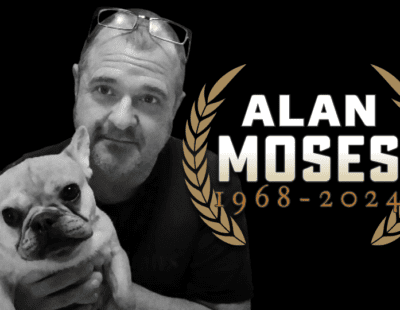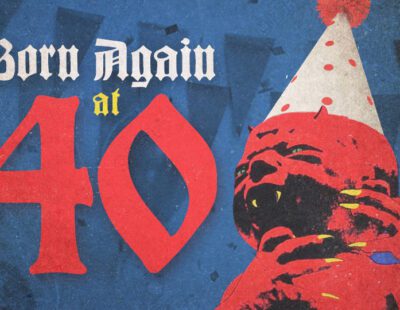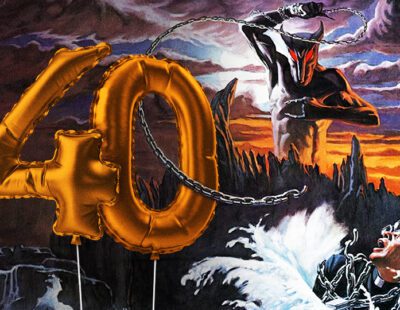
One of the further-reaching realms of the extreme we cover here at Decibel is post-rock; while we like to keep it heavy, we also enjoy bands who explore the quieter (gasp!) side of things. Which is why we were thrilled to see Temporary Residence Ltd. recently reissuing the early catalogue of Portland, Maine post-rock trailblazers Cerberus Shoal.
Now, even though I can listen to grindcore and death metal all day, Cerberus Shoal will take a permanent residence (sorry) in a very special place in my cold metal heart. Their self-titled debut album from 1995 is one of my favorite records of all time; while it may have a bit more angst to it than carries over well into adulthood, I can’t stress how much this album meant to me as a teenager. And, straight up, “Daddy as Seen from Bar Harbour” is one of the most phenomenal rock songs of our time; actually, before we go any further:
Alright, now, cut to two years later, and the band released the puzzling …and Farewell to Hightide, an album that had none of the bash-you-over-the-head quiet-loud dynamics of the debut and instead rode a very controlled, steady wave of what would come to be known as post-rock. At the time, however, it was just… weird. Extreme. Extremely weird. I was a bit disappointed when it came out, but they were still my favorite band. (Cut to a couple albums later, and I was totally off the good ship Shoal, but nothing can take away the power of this band’s first three albums.) However, that disappointment soon gave way to amazement as I let this album take me to places music had never taken me before.
Opener “Falling to Pieces, Part One” is the ultimate slow-burning album opener. It was especially jarring after the debut, not because that album didn’t slow burn at times, but because here the melodies were obtuse, nothing was obvious, the structure wasn’t A/B/A/B, it was A…. A…. what was going on here? The song’s build (basically all of its 6:45) is brilliant though, and if I was more versed in post-rock, I’d probably be throwing around names like Mogwai or Explosions in the Sky, the sense of drama and exploration on this journey of a song massive, the band using fully one of five album tracks to set the tone, the vocals and drum work leading the listener down a musical path they most likely haven’t been on before, or very likely hadn’t in 1997.
Then there’s “Broken Springs Spring Forth From Broken Clocks,” an almost-10-minute work of post-rock art, the band doing absolutely great things with the guitar work here, which nods at mid-’90s Midwestern emo but then rides a steady post-rock rhythm for much of its duration. Really, “steady” is a good word to describe this album; where the debut had peaks and valleys, Farewell is down the middle, a long, long, steady road through the countryside. Again, the drum work here is hypnotizing, hi-hat moves for miles, and, what, are those bongos? Sure, never thought I’d say this, but the bongos work. (Note: seeing the band play around this time, I can confirm there were indeed bongos involved, and they played the shit out of those things.) I’ve been listening to this song for 22 years and I think right now may have been the first time I’ve actually realized it’s an instrumental, which speaks loads to the power of the music on this great track. Although it must be heard in its entirety to grasp its power, the part when the band all comes together at around 4:50 is peak Farewell Shoal.
The curiously titled “J.B.O. vs. Blin” is next, and it’s alarming at this point to hear the sound of a human voice, given how far away from humanity the previous song took us. And it’s especially jarring because it’s not even singing, it’s one of the band’s vocalists talking, talking about records, about toilet bowls, it’s incredibly human. Then the vocals kick in, along with the brass instruments and, man, that relentless hi-hat work, the echoing twangy guitars, the huge open space… this is another incredible song, one that is dramatic but not at all overdramatic, which it could very easily be given everything I’ve just said. It’s another post-rock masterpiece. Why don’t people talk about this album in hushed tones when they’re jerking off over Godspeed You! Black Emperor? No idea, but, man, this song is one for the ages. Excellent songwriting, excellent performances from everyone, and a stunning emotional heft to it, every one of this song’s 11 minutes totally captivating.
“Make Winter a Driving Song” is even more sprawling—at a relaxed, mid-paced 12:37, the band is in no rush to get anywhere here. And, no surprise, it’s excellent, the melodies not obvious, the guitar and drum work playing off each other perfectly, the atmosphere created by the additional brass instrumentation grandiose but not ridiculous. Again, there’s no vocals, but there’s none needed. Some Cerberus Shoal songs sound like places: the ocean late at night, when no one is around. Some Cerberus Shoal songs just sound like weather: fog—lots of fog—or snow. This one is snow. I know some of this stuff gets away from Decibel’s core area of coverage, but I also think that laying down an instrumental like this as one of only five songs on an album that only has three songs with vocals is as extreme as it gets.
Now, I mentioned “three songs with vocals” there, but it’s worth noting that of those three, about one and a half don’t contain singing. It’s more like talking or, in the case of “Falling to Pieces, Part Two,” spoken word. And while it veers close to painfully awkward at points it’s still a very moving and apt way to close the album off, the listener feeling more like they’ve just experienced a powerful movie or piece of art as opposed to a rock record. Which they have: this is art, and the incredible piano closing to this song brings the listener back to planet earth with a gentle touch, the experience resembling how you feel when a Neurosis album is done: a bit stunned, a bit devastated and a bit rejuvenated. And, in a sense, you feel lucky to have been a part of what just happened.
The reissue also comes with the excellent “Lighthouse in Athens, Part One” and “Lighthouse in Athens, Part Two,” two songs which I can’t recommend enough but don’t want to go on about too much here as we’re really just talking about this album as it originally was, five songs of pure post-rock glory back when attempting to attain such a thing was a decidedly uncool career move. But this band has always followed the muse; in later years, they followed it further than I cared to go, but, like I say, nothing can ever take away what this early material means to me, and the fact that it sounds good—if not better than ever—all these years later is a huge victory. Fans of post-rock, of boundary pushing, and of extreme listening experiences can’t afford to sleep on this album any longer.
Remastered and expanded editions of both …And Farewell to Hightide and Cerberus Shoal are currently available via the Temporary Residence Bandcamp.






